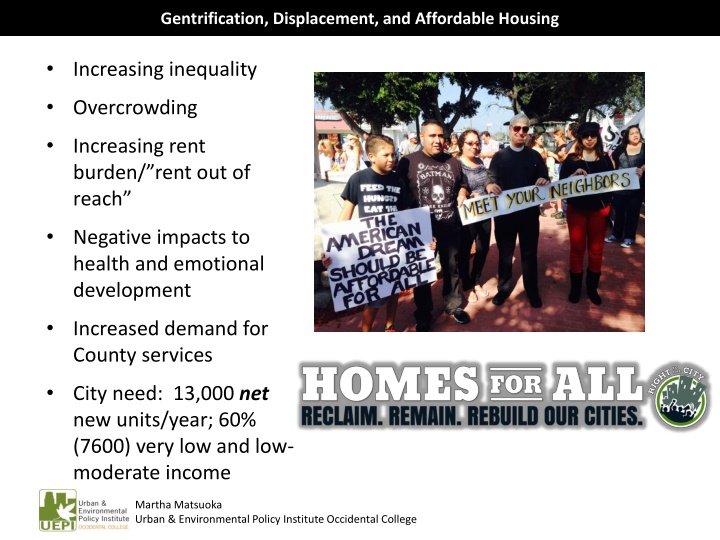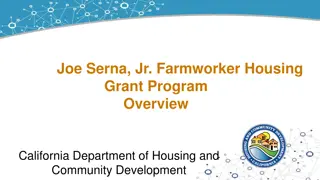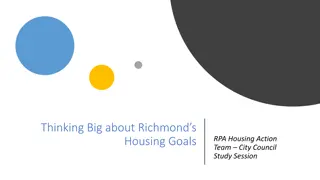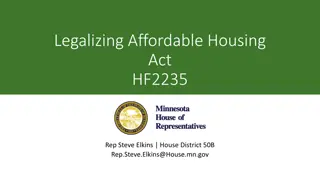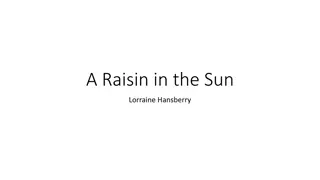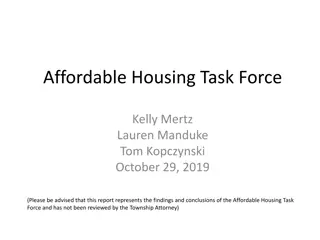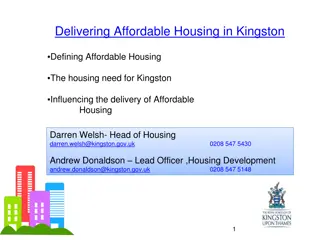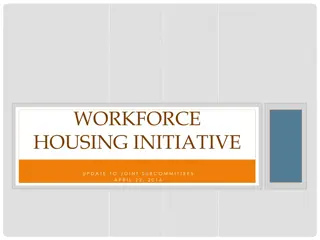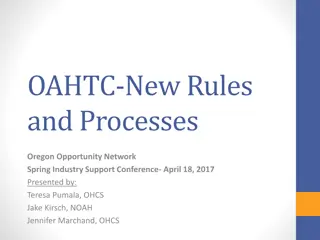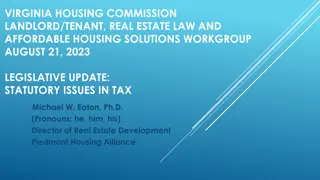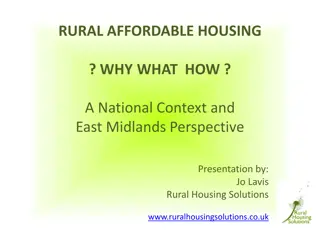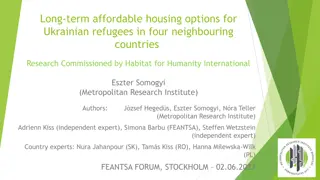Gentrification, Displacement, and Affordable Housing Issues
Gentrification and displacement in California are driven by systemic conditions such as globalization, deindustrialization, and structural racism. The impact includes increasing inequality, overcrowding, and rising rent burden, leading to negative effects on health and emotional development. Martha Matsuoka from Occidental College discusses the challenges faced by vulnerable communities and the need for affordable housing policies and community-driven solutions to address these issues.
Download Presentation

Please find below an Image/Link to download the presentation.
The content on the website is provided AS IS for your information and personal use only. It may not be sold, licensed, or shared on other websites without obtaining consent from the author.If you encounter any issues during the download, it is possible that the publisher has removed the file from their server.
You are allowed to download the files provided on this website for personal or commercial use, subject to the condition that they are used lawfully. All files are the property of their respective owners.
The content on the website is provided AS IS for your information and personal use only. It may not be sold, licensed, or shared on other websites without obtaining consent from the author.
E N D
Presentation Transcript
Gentrification, Displacement, and Affordable Housing Increasing inequality Overcrowding Increasing rent burden/ rent out of reach Negative impacts to health and emotional development Increased demand for County services City need: 13,000 net new units/year; 60% (7600) very low and low- moderate income Martha Matsuoka Urban & Environmental Policy Institute Occidental College
Gentrification and Displacement: Framing the Issue Assumptions Gentrification and displacement occur within the broader context of urban growth and development Gentrification functions and exists within a capitalist system that often pits private property rights in competition with community visions and community ownership. Gentrification and displacement are not inevitable nor necessary to our current economic and political systems Vulnerable communities have unequal power to influence projects (in the marketplace), influence policies (in the political landscape), and tell the story (frame the debates). Conditions experienced by low-income, working class communities inform solutions and strategies; leadership comes from these communities. Martha Matsuoka Urban & Environmental Policy Institute Occidental College
GENTRIFICATION AND DISPLACEMENT IN CALIFORNIA DRIVERS OF DECLINE SYSTEMIC CONDITIONS DRIVERS OF GENTRIFICATION Globalization Deindustrialization Disinvestment from urban core White flight / suburbanization Discriminatory lending Concentration of poverty Structural racism Housing crisis Economic environmental inequality/injustice Unequal power relations Inadequate market regulations Concentration of wealth & power Economic restructuring- High-tech / innovation economy New demography Reinvestment in urban core Criminalization and militarization of poor and communities of color Policy Solutions Private Profit/Elite-Driven Agenda Community-Driven Agenda Affordable housing policies Market rate / luxury housing policies Housing affordability, accessibility, long-term stability and protection, health, sustainability, quality, community control Housing as a for-profit commodity Community stabilization policies Community destabilization policies Private sector-driven investments and subsidies Community-centered policy change and implementation Reduction of rent control laws/tenant rights/homeless rights and other public protections and regulations Community plans/ planning Top-down community plans/planning Strong neighborhood and regional infrastructure Community economic development Profit-driven development Affordable housing projects For-profit housing projects Outcomes Outcomes Housing insecurity Housing security Community-defined and owned projects Market-driven projects Decline in social networks Strong social networks Economic inequality and instability Economic well-being and stability Vibrant and healthy neighborhoods for elite Vibrant and healthy neighborhoods for all Unequal power relations More equal power relations Worsening health outcomes Improving health outcomes
The Need for Tools to Create Affordable Housing in LA County By Lisa Payne, SCANPH For Economic Sustainability Roundtable s Forum on Housing Affordability September 16, 2015
Gap Between Income & Housing Costs Basic Math To afford the median monthly rent of $1200 for an apartment in LA County, need to earn: $23 per hour $48,000 per year Median renter household income is $39,000 per year. More than half of renter households can t afford the median rent. LA Co. is short 500,000 affordable homes for households making under $43,000 per year.
Results of Unaffordable Rents LA is Overcrowding Epicenter of the Country o There are 331 zip codes in the top 1% of zip codes for overcrowding in the County. o 97 or nearly 30% -- of those zip codes are in LA County. Increasing Homelessness o 44,000 homeless in LA County, up 12% from last year. o Federal government no longer provides homes for mentally ill, but also due to rising rents.
Current Strong Urban Market Intensifies Need Rising cost of homes in urban center, particularly around Transit. Neighborhoods are unaffordable to long-term residents. Increasingly drive til you qualify for rental market.
Need Better Affordable Housing Tools Rent-Controlled Apartments no new rent- controlled apartments. In hot market, landlords try to get around. Need strong protections. Public Housing Developments no more currently being created. Tenant Vouchers depend on landlords voluntarily taking them. Right now, 25% of LA City voucher recipients turn them back in because they can t find a landlord who will accept them.
Need Better Affordable Housing Tools Value Capture -- Harnessing the Market to Build & Preserve Affordable Homes Legal issues with inclusionary housing for apartments But a locality can provide building incentives to market-rate housing developers that agree to: Create affordable homes and Ensure No Net Loss of rent-controlled or other affordable apartments with development Important not to re-zone and give away densities without capturing their value for public benefit. Good tool in hot market with low starting densities (like Los Angeles).
Need Better Affordable Housing Tools Placing Fee on Commercial & Market-rate Housing Development ( Impact Fee ) To compensate for future workers needs for affordable housing. Cities that have include San Francisco, Santa Monica, and San Jose. Where fee is placed on market-rate housing development, may allow developer to build affordable homes on site instead of paying fee.
Need Better Affordable Housing Tools Private Affordable Developments, owned and operated by mission-driven developers takes public funding to build
LA City Affordable Housing Trust Fund Has Been Cut by 75%. From 2008 to 2014, annual funding in the Trust Fund fell from about $108M to about $26M. Senate Budget Bill would cut HOME by 90%, leaving $3M in Trust Fund
Funds in LA County cut 80% at federal, state & local levels; $250M lost annually due to loss of redevelopment.
Motion to Allocate Former RDA Funds for Affordable Development In 2014-15, LA County received $150 M that formerly went to RDAs throughout County. We are asking that a majority of these funds go to affordable housing. Will prioritize safety net, including families and seniors making under $43,000, formerly homeless, child-welfare-involved families, formerly incarcerated, transition aged youth. Solis office asking for focus on families making under $25,000 per year.
What You Can Do Fill out postcard to your Supervisor and return to Maira Sanchez, Chloe Chais or me TODAY. Fill out organizational endorsement form. Let one of us know you re interested in getting more involved: Lpayne@scanph.org Msanchez@scanph.org
